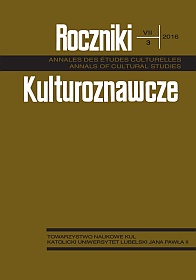The Status of Implementation of Changes in the Management of Organizations in the Cultural and Creative Sectors Resulting from Changes in the Environment
Abstract
The aim of the study is to identify the state of implementation of changes in management in organizations in the cultural and creative sectors resulting from changes in the environment. This was done by reviewing the ideas presented in the literature and conducting own empirical research. The research was both quantitative and qualitative, based on a questionnaire. It was carried out in 2015, on a group of 101 representatives of organizations from the cultural and creative sectors. Respondents were interviewed about the necessary changes in management resulting from changes in the environment and the state of implementation of these changes in the organizations in which they work. The results were statistically analyzed. Differences in the responses from the point of view of the gender of the respondents have been identified. The difference between the granted significance of the change and the degree of its implementation was also determined. Comparisons were done for independent samples, using the Kolmogotow-Smirnov test and non-parametric statistics, using the statistical package IBM SPSS version 21.0. It turned out that only part of the respondents have a full awareness of the scope and the impact of changes in management on functioning of organizations in the sector. The state of implementation of these changes in the organizations of the cultural and creative sectors is still low.
References
Bína Vladimír, Chantepie Philippe, Deroin Valérie, Frank Guy, Kommel Kutt, Kotýnek Josef, Robin Philippe: European Statistical System Network on Culture, Final Report. Luxembourg: ESSnet Culture 2012.
Classifying and Measuring the creative Industries, Department of Culture, Media and Sport. London: DCMS 2013.
Council conclusions on the contribution of culture to the implementation of the Europe 2020 Strategy, Notices from European Union Institutions, Bodies, Offices and agencies. „Official Journal of the European Union” C 175/1, 15.6.2011.
Creative & Cultural Skills: Sector Skills Assessment for the creative and cultural industries. An analysis of the skills needs of the creative and cultural industries in the UK, December 2010, s. 11-12. http://www.oph.fi/download/143169_LinkClick.pdf (dostęp: 01.09.2016).
Drucker Peter F.: Zarządzanie XXI wieku – wyzwania. Przeł. Anna i Leszek Śliwa. Warszawa: New Media 2010.
Europa 2020. Strategia na rzecz inteligentnego i zrównoważonego rozwoju sprzyjającego włączeniu społecznemu. Bruksela: Komisja Europejska 2010.
European Statistical System Network On Culture FINAL REPORT. Luxembourg: Essnet Culture 2012.
Lampel Joseph, GERMAIN Olivier: Creative industries as hubs of new organizational and business practices, „Journal of Business Research” 69:2016 Issue 7 s. 2327-2333. DOI: 10.1016/j.jbusres.2015.10.001.
Nauwelaerts Ysabel, Hollaender Iris: Innovation Management of SMEs in the Creative Sector in Flanders and the Netherlands, „Journal of Marketing Development and Competitiveness” 6:2012 Issue 3 s. 140-153.
Olszewska Barbara, Kubicka Joanna: Zmiany w zarządzaniu przedsiębiorstwem w warunkach współczesnych zmian w otoczeniu. Warszawa: Difin 2011.
Open method of coordination (OMC) working group of EU member states. Experts on better access to and wider participation in culture. A report on policies and good practices in the public arts and in cultural institutions to promote better access to and wider participation in culture. European Agenda for Culture. Work Plan for Culture 2011-2014, October 2012. http://ec.europa.eu/culture/policy/strategic-framework/documents/omc-report-access-toculture_en.pdf (dostęp: 01.09.2016).
Pratt Andy C., Jeffcutt Paul: Creativity, innovation and the cultural economy: Snake oil for the 21st century? W: Creativity, innovation in the cultural economy. Red. Andy C. Pratt, Paul Jeffcutt. London: Routledge 2009 s. 1-20.
Raport z badania „Kultura do.finansowania”. Warszawa: Ministerstwo Kultury i Dziedzictwa Narodowego 2012.
Stupples Polly: Creative contributions: The role of the arts and the cultural sector in development. „Progress in Development Studies” 14:2014 s. 115-130
Survey on access to finance for cultural and creative sectors, Evaluate the financial gap of different cultural and creative sectors to support the impact assessment of the Creative Europe Programme. Brussel: European Comission Media 2013. http://ec.europa.eu/culture/library/studies/access-finance_en.pdf (dostęp: 01.09.2016).





